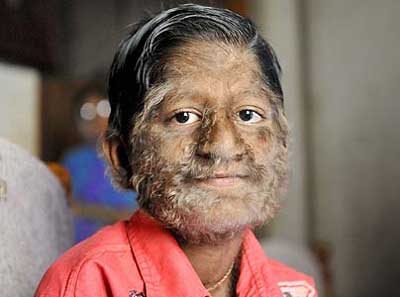Funtabulously Frivolous Friday Five 299
Just when you thought your brain could unwind on a Friday, you realise that it would rather be challenged with some good old fashioned medical trivia FFFF, introducing the Funtabulously Frivolous Friday Five 299 – Halloween Special.
Question 1
Why would having the condition ‘argyria’ be protective against vampire bites?
Reveal the funtabulous answer
Vampires would find the silver most distasteful!
Argyria is the discolouration of the skin from chronic contact with, or ingestion of, silver salts. It is common amongst workers in the silver industry (mining, refinery, silverware, electroplating and photography) through prolonged skin exposure, and in those whom take colloidal silver preparations orally as health tonics. Other exposures include medication with silver salts, especially nasal or urethral irrigation drops, surgical and dental procedures (silver sutures in abdominal surgery and silver dental fillings).
Rosemary Jacobs (pictured below at 36) has lived with silver skin for 60 years after she was given nose drops containing silver when she was 11 years old.
References:
Question 2
From which disease, would a monthly (or even more frequent) visit from your local vampire for some friendly venesection, would you derive therapeutic benefit?
Reveal the funtabulous answer
Haemochromatosis.
Haemochromatosis is a mostly autosomal recessive condition in which the absorption of dietary iron exceeds one’s requirements.
The disease is characterised by an inappropriate increase in intestinal iron absorption due to reduced expression of the iron regulatory protein, hepcidin. Left untreated, haemochromatosis can result in progressive iron overload and liver toxicity.
Treatment with phlebotomy remains the first‐line therapy, and if instigated early leads to a normal life expectancy. A healthy, well‐balanced diet is also recommended to be incorporated as part of the ongoing management of the disease as well as avoidance of obesity and excessive alcohol intake.
Hemochromatosis is sometimes referred to as bronze diabetes because it can lead to darkening of the skin and hyperglycaemia.
References:
- Treatment of haemochromatosis
- Radford-smith DE et al. Haemochromatosis: a clinical update for the practising physician. Int Med Journal 2018 Vol 48, Issue 5
- Hemochromatosis – Bronze Diabetes
Question 3
Speaking of monthly visits and lunar cycles, what effect does the waxing and waning on the moon have on frequency of complications and survival post-surgery?
Reveal the funtabulous answer
Nothing.
Given I am not a surgeon I was quite surprised at the seeming plethora of articles that have investigated frequency of complications and various outcomes of surgeries that have occurred during different phases of the lunar cycle and under different zodiac signs.
Procedures that have been studied against the loony, sorry, lunar cycle include: elective spinal surgery, radical cystectomy, shock wave lithotripsy, living donor kidney transplantation, cataract surgery (n = 16,965), amongst others.
Pleasingly, no article found a positive association with zodiac influence or phase of lunar cycle with surgical outcomes; indeed, some authors went so far as to suggest that scheduling patients for surgery should not be influenced by phases of the moon at all. Surprisingly, none of these articles were published in any Christmas editions of their journals.
Not to be one to shy from some good old fashioned superstition (this being an emergency medicine blog after all – full moons and Friday the 13th), the World Journal of Surgery published a study in 2011 titled:
“Popular belief meets surgical reality: impact of lunar phases, Friday the 13th and zodiac signs on emergency operations and intraoperative blood loss.”
Their conclusion:
Scientific analysis of our data does not support the belief that moon phases, zodiac signs, or Friday 13th influence surgical blood loss and emergency frequency. Our data indicate that such beliefs are myths far beyond reality
I am inclined to agree, unless on an evening shift the next Friday the 13th, in which case I’ll have to turn around three times very quickly and rub my lucky rabbit’s foot.
References:
- Joswig H et al. The influence of lunar phases and zodiac sign ‘Leo’ on preoperative complications and outcome in elective spine surgery. Acta Neurochirurgica. 2016;158(6):1095-1101
- May M et al. Lunar phases and zodiac signs do not influence quality of radical cystectomy–a statistical analysis of 452 patients with invasive bladder cancer. Int Urol Nephrol. 2007;39(4):1023-30.
- Schuld J et al. Popular belief meets surgical reality: impact of lunar phases, Friday the 13th and zodiac signs on emergency operations and intraoperative blood loss. World J Surg. 2011;35(9):1945-9
Question 4
If the werewolf was alive and well today (and not Michael J Fox), what disease name would we ascribe him?
Reveal the funtabulous answer
Congenital hypertrichosis terminalis.
Hypertrichosis is excessive hair growth over and above the normal for the age, sex and race of an individual, in contrast to hirsutism, which is excess hair growth in women following a male distribution pattern.
Hypertrichosis can develop all over the body or can be isolated to small patches. Hypertrichosis may be congenital or acquired. Congenital hypertrichosis terminalis, further, is a variation of congenital hypertrichosis. This condition involves all over body hair growth, but the hair is fully pigmented terminal hair (versus lanugo variants); the condition is almost always associated with gingival hyperplasia (teeth defects). People with congenital hypertrichosis are often referred to as wolf men, werewolves and ape-men.
Reference:
- Hypertrichosis, DermNet NZ
Question 5
Once you’re done carving your pumpkin, don’t throw those seeds away! What organ can potentially benefit from the ingestion of pumpkin seeds?
Reveal the funtabulous answer
The prostate
Pumpkin seeds have been used to treat micturition disorders, specifically in men with benign prostatic hypertrophy (BPH). Pumpkin seeds contain fatty acids (≤64% linoleic acid), specific delta-7-sterols, tocopherols and micronutrients.
Oral high dose pumpkin seeds and pumpkin seed oil has been associated with reduced prostate weight in animal models. Anti-inflammatory effects of pumpkin seed oil have been observed in a rat arthritis model.
The 2015 German Research Activities on Natural Urologicals (GRANU) study (n = 1,431 with symptomatic BPH) randomly assigned subjects to either pumpkin seed, capsules with pumpkin seed extract, or placebo. After 12 months, the pumpkin seed group (but not the pumpkin seed oil group) showed a positive symptomatic response above that of placebo.
Reference:
- Vahlensieck W et al. Effects of Pumpkin Seed in Men with Lower Urinary Tract Symptoms due to Benign Prostatic Hyperplasia in the One-Year, Randomised, Placebo-Controlled GRANU Study. Urol Int 2015;94:286-295
And Finally some carving to completely eclipse my own…

FFFF
Funtabulously Frivolous Friday Five
Dr Mark Corden BSc, MBBS, FRACP. Paediatric Emergency Physician working in Northern Hospital, Melbourne. Loves medical history and trivia...and assumes everyone around him feels the same...| LinkedIn |



